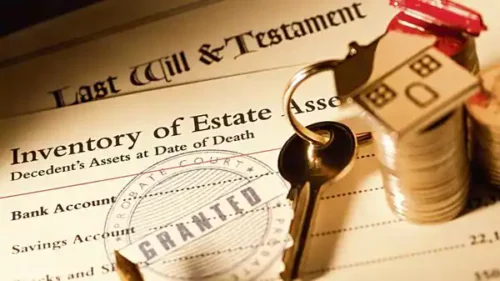“A son can bear with equanimity the loss of his father, but the loss of his inheritance may drive him to despair.”
–Niccolo Machiavelli
I remember reading a book called Die Broke (#aff) by Stephen Pollan and Mark Levine sometime shortly after it came out. I don’t remember all of the details of the book (perhaps one of my readers who read it more recently or has a better memory than I do can fill in the gaps), but I do remember that the main premise of the book was to convert assets into annuities to create a lifetime income stream.
I was moved by the book. Not necessarily by the notion to convert all of the assets into annuities – I was far too undereducated to have an analytical evaluation of that notion – but by one notion which stuck in my head. I honestly don’t remember if I read it in the book (I probably did) or came up with the idea on my own (I probably didn’t), but it really resonated with me. It resonated so much that I asked my parents to read the book and to live by the strategies, or, at least, the intent behind them. Also, I remember well my grandmother not being happy at receiving an inheritance. The idea was…
If You’re Waiting for Someone to Die to Get Their Assets, You’re One Sick Puppy

Yes, I called you a sick *******. I’d tell you what I really thought if I didn’t think the SEC would hop all over me. You want to know why?
- You are waiting for someone to die. Yes. You’re waiting for someone to die. To cease their existence on their earth. Just so you can benefit from their material assets. You can benefit from their hard work, frugality, and intelligence, but only when they’re dead. So, in effect, you’re hoping that they die so that you can get what was theirs. That’s a sick, sick form of envy.
- Your parents raised you for eighteen or so years. They don’t owe you anything. It’s their money. They get to choose what they want to do with it. If they want to give it all to the Society for the Betterment of Sock Lint, then that’s their choice, not yours.
- You have a crazy sense of entitlement. For some reason, you think that because you were born on this earth and didn’t yet die yourself or killed anyone along the way, you deserve your parents’ money. This is just one step along many others on a slippery slope that could lead you to not think that you have to work to earn your way in this world and that the government will take care of all of your whims and desires without you lifting a finger. Good luck getting people to fill your tin cup.
- They might live longer than anyone thinks. Averages are just that – there are higher numbers and there are lower numbers. So, if the average life expectancy is 80, there’s a decent chance that they’ll outlive that number, and they’ll need “your inheritance” for their living expenses. Do you want them to live like paupers so that you can live high on the hog?
Apparently, there’s a disconnect between parents and kids when it comes to the subject of inheritance. A recent article in USA Today showed that 40% of people aged 13-22 expect to receive an inheritance while only 16% of parents expect to provide one. Granted, I don’t expect a 13-year-old (or even, necessarily, a 22-year-old) to have the wisdom to understand what expecting an inheritance really means, but it does show that there is a disconnect with both the expectations of what they will receive and with what it will really take to be successful in the world. There aren’t many family dynasties or dynasty trusts out there, so chances are that Junior or Juniorette are going to have to make it on their own.
What to Tell the Kids About Their (Lack of an) Inheritance

For some reason, a lot of families don’t feel comfortable about talking about inheritances or what’s in the will. They expect some grand reading of the will like is portrayed in the movies rather than a horrendous inheritance fight and family pier 6 brawl (nobody came up with fighting terminology like Gordon Solie) like is described in John Grisham’s The Testament (#aff). Failure to set expectations both properly and early will just lead to festering resentment and downright fighting and squabbling if the expectations aren’t later met.
Here’s some things to think about when discussing the inheritance with the kids:
- It’s your money. There is absolutely nothing wrong with wanting to bequeath a lasting gift to your children. I think that it’s a pretty common parental desire, if not instinct, to want to take care of the kids for as long as possible and leave them with something when you’re not around. Still, as long as you’re around, it’s your money, not theirs, and if they don’t expect anything, then they’ll be that much happier if there is something to leave behind…if that’s your plan.
- They need to go out and work. The average life expectancy in the United States is about 78 years old; adjusts for childhood mortality, and it’s closer to 80. The average age of a first-time mother is about 25 years old. That means that if the average first child enters the workforce at age 22 with a shiny new bachelor’s degree, he’s going to have to work an average of 33 more years before getting that inheritance. That’s a long, long time to wait while living on ramen cakes. Chances are that the inheritance won’t cover the accumulated debt, even if he can find a loan shark gullible enough to lend him money for that long. So, waiting on the inheritance is not a good financial planning strategy.
- Gifting is a very viable option. There are multiple benefits to gifting while you’re still alive. First, you get the money out of your estate, reducing potential estate tax liabilities. Second, you get to enjoy their enjoyment of the gift while you’re still alive. Third, you get to potentially influence what is done with the gifted money. If you try to influence the behavior through the inheritance, you’ll have to establish a trust, which isn’t always economical or through conditions precedent or subsequent in a will.
If you’re expecting an inheritance, it’s time for you to change your attitude about life. If you’re a parent of a child expecting an inheritance, it’s time to have a discussion about what’s going to happen with your estate. Inheritance is a gift of love, not a rite of passage.
Author Profile
- John Davis is a nationally recognized expert on credit reporting, credit scoring, and identity theft. He has written four books about his expertise in the field and has been featured extensively in numerous media outlets such as The Wall Street Journal, The Washington Post, CNN, CBS News, CNBC, Fox Business, and many more. With over 20 years of experience helping consumers understand their credit and identity protection rights, John is passionate about empowering people to take control of their finances. He works with financial institutions to develop consumer-friendly policies that promote financial literacy and responsible borrowing habits.
Latest entries
 Low Income GrantsSeptember 25, 2023How to Get a Free Government Phone: A Step-by-Step Guide
Low Income GrantsSeptember 25, 2023How to Get a Free Government Phone: A Step-by-Step Guide Low Income GrantsSeptember 25, 2023Dental Charities That Help With Dental Costs
Low Income GrantsSeptember 25, 2023Dental Charities That Help With Dental Costs Low Income GrantsSeptember 25, 2023Low-Cost Hearing Aids for Seniors: A Comprehensive Guide
Low Income GrantsSeptember 25, 2023Low-Cost Hearing Aids for Seniors: A Comprehensive Guide Low Income GrantsSeptember 25, 2023Second Chance Apartments that Accept Evictions: A Comprehensive Guide
Low Income GrantsSeptember 25, 2023Second Chance Apartments that Accept Evictions: A Comprehensive Guide

